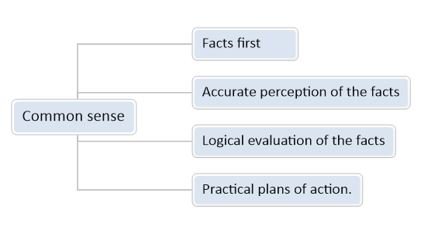What is Common Sense?
What is Common Sense?
Common sense is "everyday logic".
The term "common sense" was first coined by Aristotle, the ancient Greek philosopher, who said that humans were the only animal on the planet equipped with an innate sense of logic. Aristotle said everyone is born with the potential to think logically, therefore logic is the COMMON sense. (ie the logical sense is common to all humans).
What does common sense logic mean in practice?
There are three distinguishing characteristics of common sense:
- A facts first system.
- A rejection of mystical or magical explanations.
- Always practical and workable.
1. The first rule of common sense is: Get the facts.
Common sense is a facts first system of thought. It is reality based. Common sense is about dealing with the world as it really is, not how you feel it should be.
Therefore, you need to ensure you don't make decisions based on instinct, vague feelings, rumour, guesses or fake news.
Check your facts and check your sources.
Sherlock Holmes said, "It is a capital mistake to theorize before one has the facts".
2. Common sense implies a rejection of mystical or magical methods.
Common sense means we reject methods that rely on luck, chance, fate, the stars, destiny, the spirits, or that things happen "somehow".
Common sense tells us that people don't pass exams, just because they are lucky, or win races because fate is on their side.
People do not fail because "now is not their time".
Common sense looks for non-mystical, non-religious, non-magical explanations and methods.
If something happens, then it happens due to worldly, natural causes, NOT supernatural, magical, or religious causes.
So common sense is a logical, factual, scientific way of looking at things.
3. Practical and workable.
Because common sense is factual, it is also practical.
Because it is scientific, it is also pragmatic.
Therefore, all your theories must be practical, workable and achievable in the real world. Therefore, never evade facts you don't like and never invent facts you wish were true.
How can you develop common sense?
Resolve to deal with the world head-on; take a hard-headed, practical, factual, non-mystical approach to your life and its problems.
If you do that, then people around you will say you have plenty of common sense.

Definition: common sense
In personal effectiveness, common sense is a thinking skill that puts checked facts first, throws out magic and fate, hunts for ideas that work in real life, and lives in every person. If any one of these parts is missing, we cannot call it common sense. It is simple, clear logic for daily use.
Show CG4D Definition
- puts checked facts first
- rejects magic or fate based causes
- seeks ideas that work in real life
- open to every person
Article Summary
Common sense is everyday logic: put facts first, ignore magic ideas and choose acts that work in real life. When you test each idea against proof, you dodge errors, solve problems fast and earn trust. Clear, practical thinking is a skill anyone can grow.
Frequently Asked Questions
Here are some questions that frequently get asked about this topic during our training sessions.
What did Aristotle mean by common sense?
Why is the 'facts first' rule vital to common sense?
How can I check facts before making a choice?
Does common sense reject luck, fate, and magic?
What makes a plan practical in common sense terms?
Is common sense the same as intuition?
How do I grow my everyday logic skills?
Thought of something that's not been answered?
Did You Know: Key Statistics
Ofcom’s 2024 ‘News Consumption in the UK’ study found 64% of adults worry about false news online and 31% have shared a story later shown to be wrong. LinkedIn’s 2025 Workplace Learning Report states 68% of UK hiring bosses list critical thinking as the top skill they seek.Blogs by Email
Do you want to receive an email whenever we post a new blog? The blogs contain article 5-10 minutes long - ideal for reading during your coffee break!
Further Reading in Personal Effectiveness
-
Mind Hack to Improve Performance
Use this mind hack to improve performance: stop asking 'Can I do this?' and focus on 'How can I do this?' to save energy, raise confidence and hit goals faster.
Read Article > -
Do you know when to stop?
Know when to stop arguing, joking, eating, drinking and working. Practical self-control tips improve health, relationships and work-life balance today.
Read Article > -
How to Handle a Crisis Situation
Master crisis management with a clear six-step cycle: get facts, rank them, set moral goals, plan, act and refine to stay calm, limit damage and recover faster.
Read Article > -
What is Impression Management?
Learn practical impression management tips to secure good first impressions, avoid careless behaviour, and shape how others judge your professional image.
Read Article > -
How to Respond to any Situation
Learn how logical thinking helps you avoid bias, weigh facts and pick the best response in work and life. Use our clear steps to run on reason every time.
Read Article >
Looking for Personal Development Training?
If you're looking to develop your Personal Effectiveness Skills, you may find this Personal Development Training Course beneficial:
Open Training Course Pricing and Availability
Next Open Course Starts in 10 days, Leeds City, places available






